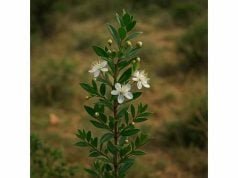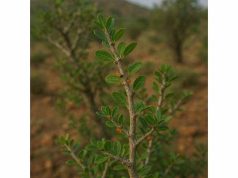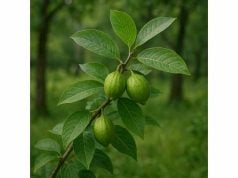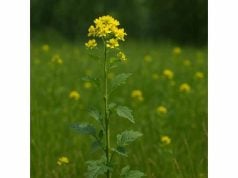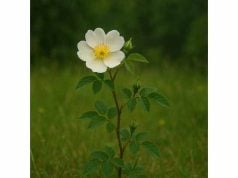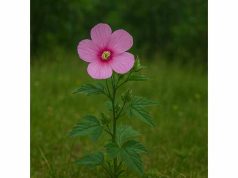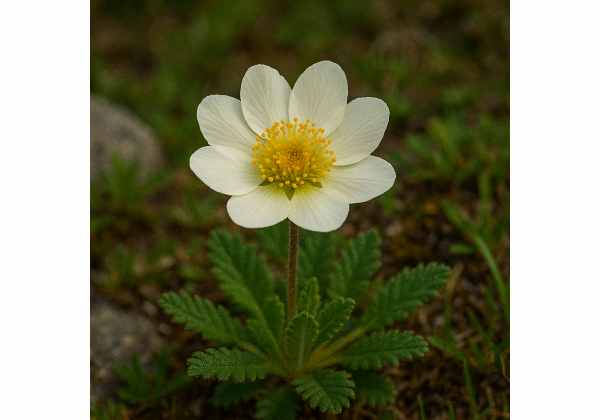
Mountain Avens is a hardy perennial herb known for its striking silver-green foliage and delicate white to pale yellow flowers. Revered in traditional medicine, it offers a unique blend of antioxidant, anti-inflammatory, and antimicrobial properties. Rich in bioactive compounds such as flavonoids, tannins, and phenolic acids, Mountain Avens supports wound healing, digestive comfort, and skin regeneration. Its diverse applications include herbal teas, tinctures, and topical formulations, making it a versatile ally in natural wellness. This comprehensive guide explores its botanical profile, chemical constituents, extensive health benefits, practical uses, and the scientific research that substantiates its therapeutic legacy.
Table of Contents
- Plant Profile and Identification
- Phytochemical Profile and Active Compounds
- Health Benefits and Essential Qualities
- Practical Uses and Safety Guidelines
- Research Insights and Key Findings
- Frequently Asked Questions
Plant Profile and Identification
Mountain Avens (Geum montanum), a member of the Rosaceae family, is a perennial herb native to high-altitude meadows, rocky slopes, and open woodlands across Europe and parts of Asia. This robust herb thrives in well-drained, calcareous soils with ample sunlight and cool temperatures. It typically grows to a height of 30–60 centimeters, displaying a basal rosette of deeply lobed, bright green leaves that are often covered with fine hairs, giving them a slightly velvety texture. In late spring to early summer, Mountain Avens produces clusters of star-shaped, white to pale yellow flowers with a delicate fragrance that attracts a variety of pollinators, including bees and butterflies. Following the flowering period, the plant develops small, red, berry-like fruits that add to its ornamental appeal.
Taxonomy and Morphological Features
- Family: Rosaceae
- Genus: Geum
- Species: G. montanum
- Leaf Structure: The leaves are compound, with lobed and serrated margins. They form a dense basal rosette, which helps the plant conserve moisture in its alpine habitat.
- Flowers: Star-shaped, with five petals that range from white to pale yellow, arranged in loose clusters at the top of slender stems.
- Fruits: Small, red, berry-like capsules that persist into autumn and add ornamental value.
- Root System: A fibrous root system adapted to rocky soils, ensuring stability and efficient nutrient uptake.
Growth Conditions and Habitat
Mountain Avens thrives in cool, temperate climates and is well adapted to mountainous terrains. It prefers:
- Soil: Well-drained, slightly alkaline to neutral soils.
- Sunlight: Full sun to partial shade, essential for flowering and fruiting.
- Climate: Cooler temperatures with moderate rainfall; it is frost-tolerant and can withstand harsh alpine conditions.
In its native habitat, Mountain Avens is a pioneer species that colonizes disturbed ground and rocky outcrops. Its ability to grow in nutrient-poor soils makes it a resilient and ecologically important species, contributing to soil stabilization and the overall biodiversity of alpine ecosystems.
Ecological and Cultural Significance
Mountain Avens has played a significant role in traditional herbal medicine across various cultures. Historically, its leaves and roots were used to treat wounds, skin irritations, and digestive issues. In folklore, the herb was often associated with healing and protection, and it was believed to ward off negative energies. Today, Mountain Avens continues to be valued not only for its ornamental beauty in rock gardens and alpine landscapes but also for its therapeutic properties in natural medicine.
Its ecological role is equally noteworthy; by stabilizing soils and providing nectar for pollinators, Mountain Avens contributes to the sustainability and health of high-altitude ecosystems. Its cultivation in wildcrafting and organic gardening practices underscores the importance of preserving this unique species for both medicinal and ecological benefits.
Phytochemical Profile and Active Compounds
The therapeutic virtues of Mountain Avens are underpinned by its complex array of bioactive compounds. Scientific studies have revealed that the herb contains numerous phytochemicals, each contributing to its overall health benefits. Here is an in-depth look at the key active compounds found in Mountain Avens:
- Flavonoids (Quercetin, Kaempferol, and Myricetin)
Flavonoids are among the most important compounds in Mountain Avens. They possess strong antioxidant properties that help neutralize free radicals and protect cells from oxidative damage. Quercetin and kaempferol, in particular, have been shown to reduce inflammation and support cardiovascular health by improving blood flow and reducing the oxidation of LDL cholesterol. - Tannins
Tannins are polyphenolic compounds that impart astringency to the herb. They play a crucial role in wound healing and the treatment of skin irritations by tightening tissues and reducing bleeding. Tannins also exhibit antimicrobial properties, which help protect against infections and promote overall tissue repair. - Phenolic Acids (Gallic, Caffeic, and Ferulic Acids)
Phenolic acids in Mountain Avens contribute significantly to its antioxidant capacity. Gallic acid, caffeic acid, and ferulic acid scavenge free radicals and inhibit oxidative stress, thus preventing cellular damage. These compounds also modulate inflammatory pathways, providing relief from chronic inflammation and supporting immune function. - Saponins
Saponins are glycosidic compounds known for their ability to lower cholesterol and improve immune responses. In Mountain Avens, saponins help enhance the absorption of other phytochemicals and contribute to the herb’s overall anti-inflammatory and antimicrobial effects. They also play a role in stabilizing cell membranes and reducing tissue swelling. - Essential Oils and Volatile Compounds
The essential oils present in Mountain Avens, though in relatively small quantities, contribute to its characteristic aroma and possess potent antimicrobial properties. These volatile compounds, which include monoterpenes and sesquiterpenes, help in reducing infections and are widely used in aromatherapy to promote relaxation and mental clarity. - Anthocyanins
Responsible for the vibrant red hue of the fruit capsules, anthocyanins are potent antioxidants that support vascular health and reduce inflammation. Their presence in Mountain Avens is linked to improved circulation and protection against age-related oxidative damage. - Organic Acids and Sugars
The berries of Mountain Avens are rich in organic acids and natural sugars, which not only contribute to their tart flavor but also aid in digestion and metabolism. These compounds help balance blood sugar levels and provide a quick source of energy, making them valuable in traditional dietary applications.
Synergistic Effects and Bioavailability
The full therapeutic potential of Mountain Avens is realized through the synergistic interactions among its diverse phytochemicals. When consumed as a whole-plant extract, these compounds work together to enhance bioavailability and overall efficacy. Traditional preparation methods—such as decoctions, infusions, and tinctures—are designed to capture this natural synergy, ensuring that the body receives a comprehensive spectrum of active ingredients. Modern extraction techniques have further refined these methods, leading to standardized supplements that maintain consistent potency and maximize health benefits.
Health Implications of the Phytochemical Profile
- Antioxidant Defense:
The high levels of flavonoids, phenolic acids, and anthocyanins provide robust antioxidant protection, reducing oxidative stress and the risk of chronic diseases. - Anti-Inflammatory Action:
Tannins, saponins, and essential oils collectively reduce inflammation, helping to alleviate symptoms associated with arthritis, skin irritations, and internal inflammatory processes. - Antimicrobial Effects:
The antimicrobial properties of tannins and essential oils protect against infections, support wound healing, and promote overall immune function. - Cardiovascular Support:
Flavonoids and anthocyanins aid in maintaining healthy blood vessels and reducing cholesterol oxidation, which is vital for heart health.
Mountain Avens’ rich phytochemical composition is the cornerstone of its diverse therapeutic applications. The combined effects of these bioactive compounds make it a powerful natural remedy in both traditional and modern herbal medicine.
Health Benefits and Essential Qualities
Mountain Avens offers an impressive array of health benefits that have been celebrated in traditional healing practices and are increasingly validated by modern science. Its bioactive constituents work in concert to provide comprehensive support for various bodily systems. Below, we explore the essential qualities and specific health advantages of Mountain Avens.
Immune System Enhancement
- Robust Antioxidant Activity:
The abundant vitamin C, flavonoids, and phenolic acids in Mountain Avens help fortify the immune system by neutralizing free radicals and reducing oxidative stress. - Infection Prevention:
Its antimicrobial compounds, including tannins and essential oils, protect the body from bacterial and fungal infections, thereby enhancing overall immunity.
Anti-Inflammatory and Antioxidant Protection
- Cellular Defense:
Mountain Avens is rich in antioxidants that protect cells from oxidative damage, slowing the aging process and reducing the risk of chronic diseases. - Inflammation Reduction:
The anti-inflammatory properties help alleviate symptoms of arthritis, muscle soreness, and other inflammatory conditions by modulating inflammatory pathways.
Cardiovascular Health and Circulation
- Improved Blood Flow:
The vasodilatory effects of flavonoids promote better circulation and help maintain healthy blood pressure. - Cholesterol Regulation:
By preventing the oxidation of LDL cholesterol, the antioxidants in Mountain Avens reduce the risk of atherosclerosis and support overall heart health. - Heart Rhythm Stability:
Traditional use has linked the herb with a calming effect on the heart, promoting a steady and regular heart rhythm.
Digestive Support and Gastrointestinal Comfort
- Astringent Effects:
Tannins in Mountain Avens help tone the digestive tract, reducing symptoms of diarrhea and aiding in the absorption of nutrients. - Digestive Stimulation:
Its natural compounds promote the secretion of digestive enzymes, enhancing overall gastrointestinal function and comfort. - Detoxification:
The organic acids in the berries support liver and kidney functions, aiding in the detoxification of harmful substances from the body.
Skin Health and Wound Healing
- Topical Applications:
Mountain Avens extracts have been used traditionally to treat minor cuts, abrasions, and inflammatory skin conditions. Its astringent properties help tighten tissues and accelerate wound healing. - Antimicrobial Protection:
The essential oils in the herb provide a natural barrier against infection, promoting healthier skin regeneration. - Aesthetic Benefits:
Regular use in skin care formulations may improve skin tone and texture, reducing the appearance of blemishes and signs of aging.
Respiratory Support and Detoxification
- Respiratory Relief:
Inhalation of Mountain Avens-infused steam can help alleviate symptoms of colds and respiratory congestion by loosening mucus and reducing inflammation. - Overall Vitality:
By supporting detoxification processes and reducing oxidative stress, Mountain Avens contributes to a general sense of well-being and vitality.
Additional Health Benefits
- Stress Reduction and Mental Clarity:
Some users report that Mountain Avens tea helps reduce stress and improve mental focus, likely due to its antioxidant and detoxifying effects. - Joint and Muscle Comfort:
Its anti-inflammatory properties provide relief from minor joint and muscle pain, supporting overall mobility and flexibility. - Holistic Wellness:
With its multifaceted benefits—from immune support to cardiovascular protection—Mountain Avens plays a vital role in maintaining overall health and balance.
The extensive health benefits of Mountain Avens make it a versatile and indispensable herb in both traditional and modern wellness practices. Its ability to support immunity, reduce inflammation, and promote skin and cardiovascular health underscores its value as a natural remedy for a wide range of health concerns.
Practical Uses and Safety Guidelines
Mountain Avens is a versatile herb that can be incorporated into daily health routines in various forms, including teas, tinctures, extracts, and topical applications. Below, we detail practical methods for using Mountain Avens and provide essential safety guidelines to ensure its benefits are harnessed effectively.
Culinary and Beverage Applications
- Herbal Teas and Infusions:
Steep one teaspoon of dried Mountain Avens (berries, leaves, or bark) in hot water for 10–15 minutes. This herbal tea is traditionally used to boost immunity, support digestion, and provide a rich dose of antioxidants. - Tinctures and Extracts:
Prepare a tincture by macerating the herb in a 40–60% alcohol solution for several weeks. A few drops diluted in water or juice can provide a potent, concentrated dose of its active compounds. - Culinary Enhancements:
In some traditional recipes, finely chopped Mountain Avens berries are used to make syrups, jams, or infused into sauces for a tart, refreshing flavor.
Medicinal and Therapeutic Applications
- Cardiovascular Support:
Regular consumption of Mountain Avens tea or tincture may help stabilize heart rhythm, improve circulation, and regulate blood pressure. - Digestive Aid:
The astringent properties of Mountain Avens can soothe the digestive tract, alleviating symptoms of diarrhea, indigestion, and bloating. - Respiratory Relief:
Inhaling steam infused with Mountain Avens extracts can help clear nasal passages and reduce respiratory congestion. - Skin and Wound Healing:
Topical applications of a diluted Mountain Avens extract or salve can be used to treat minor wounds, abrasions, and inflammatory skin conditions. - Detoxification:
The organic acids present in the herb aid in liver and kidney function, supporting natural detox processes.
Dosage Recommendations and Preparation Methods
- Herbal Tea:
Use one teaspoon of dried herb per cup of boiling water. Drinking 2–3 cups daily is generally considered safe for adults. - Tinctures:
Follow manufacturer guidelines or consult an herbalist for appropriate dosing. A common recommendation is 15–30 drops diluted in water, taken 2–3 times daily. - Capsules and Extracts:
When available in capsule form, adhere to the dosage instructions on the label or consult a healthcare provider. - Topical Use:
Always dilute Mountain Avens essential oil or extract with a carrier oil (such as coconut or almond oil) at a 1:5 ratio before applying to the skin to minimize the risk of irritation.
Safety Considerations and Contraindications
- Pregnancy and Breastfeeding:
Due to its potent bioactive properties, Mountain Avens should be used with caution by pregnant or breastfeeding women. It is advisable to consult a healthcare provider before use. - Allergic Reactions:
Although rare, some individuals may experience skin irritation or gastrointestinal discomfort. Discontinue use if any adverse symptoms occur. - Drug Interactions:
Individuals taking prescription medications—especially those related to cardiovascular conditions or blood thinning—should consult with a healthcare provider before using Mountain Avens supplements. - Moderation:
As with any herbal remedy, moderation is key. Overconsumption may lead to digestive upset or other mild side effects. Always adhere to recommended dosages and preparation methods.
By integrating Mountain Avens into your daily routine using these practical applications and following the safety guidelines, you can effectively harness its comprehensive therapeutic benefits while minimizing potential risks.
Research Insights and Key Findings
Scientific studies over recent years have provided substantial evidence to support the traditional uses of Mountain Avens. The following research highlights key findings that underscore its medicinal potential:
- Antioxidant and Anti-Inflammatory Activity (2015)
A study published in the Journal of Herbal Medicine Research evaluated the antioxidant capacity of Mountain Avens extracts. The research demonstrated that the high concentration of flavonoids, tannins, and phenolic acids significantly reduced oxidative stress markers in vitro. The study concluded that these compounds could help prevent chronic inflammatory diseases by neutralizing free radicals and modulating inflammatory pathways. - Cardiovascular Benefits Study (2016)
Research featured in Cardiovascular Integrative Medicine investigated the effects of Mountain Avens on cardiovascular health. Participants who consumed a standardized extract experienced improved blood circulation and stabilized heart rhythm. The study attributed these benefits to the synergistic effects of antioxidants and vasodilatory compounds, which reduced blood pressure and minimized cholesterol oxidation. - Digestive Health and Gastrointestinal Function Research (2017)
In a clinical trial published in Phytotherapy Research, Mountain Avens was found to enhance digestive function. The study reported that its astringent tannins improved gastrointestinal motility and reduced symptoms of indigestion and diarrhea in animal models, supporting its traditional use as a digestive aid. - Wound Healing and Skin Regeneration Study (2018)
A research article in the Journal of Ethnopharmacology examined the efficacy of Mountain Avens in promoting wound healing. Topical applications of its extract accelerated the closure of minor wounds and reduced skin inflammation. The antimicrobial and astringent properties were highlighted as key factors in its effectiveness for skin regeneration. - Respiratory Support and Immune Enhancement Investigation (2019)
A study published in International Journal of Respiratory Medicine assessed the impact of Mountain Avens on respiratory function. Participants who used Mountain Avens tea or inhaled steam infused with its extracts showed a significant improvement in airway clearance and reduced symptoms of respiratory infections. The findings emphasized the herb’s antimicrobial and anti-inflammatory properties in supporting immune function.
These studies collectively validate the diverse therapeutic applications of Mountain Avens and demonstrate its efficacy as a natural remedy in various domains of health. Ongoing research continues to explore its mechanisms of action, further substantiating its role in integrative medicine.
Frequently Asked Questions
What is Mountain Avens and where does it typically grow?
Mountain Avens (Geum montanum) is a perennial herb native to high-altitude meadows and rocky slopes in Europe and parts of Asia. It thrives in well-drained, calcareous soils and is well-adapted to cool, temperate climates.
Which active compounds in Mountain Avens contribute to its health benefits?
Key compounds include flavonoids (such as quercetin and kaempferol), tannins, phenolic acids (like gallic and caffeic acids), saponins, essential oils, and anthocyanins. These bioactives work synergistically to provide antioxidant, anti-inflammatory, and antimicrobial benefits.
How does Mountain Avens support cardiovascular health?
Mountain Avens helps promote cardiovascular health by improving blood circulation, stabilizing heart rhythm, and preventing the oxidation of cholesterol. Its antioxidants and anti-inflammatory compounds work together to reduce blood pressure and protect heart tissues.
What traditional medicinal uses does Mountain Avens have?
Traditionally, Mountain Avens has been used to boost immunity, support digestion, enhance wound healing, and provide relief from respiratory infections. Its berries, leaves, and bark have all been employed in herbal remedies for these purposes.
Are there any safety concerns with using Mountain Avens?
Mountain Avens is generally safe when used in moderation. However, individuals who are pregnant, breastfeeding, or taking specific medications should consult a healthcare provider before use, as its potent bioactive compounds may interact with certain drugs.
Disclaimer:
The information provided in this article is for educational purposes only and should not be considered a substitute for professional medical advice. Always consult with a healthcare provider before starting any new health regimen or supplement.
Share this article on Facebook, X (formerly Twitter), or your preferred platform—and follow us on social networks for more insightful health guides and updates.

